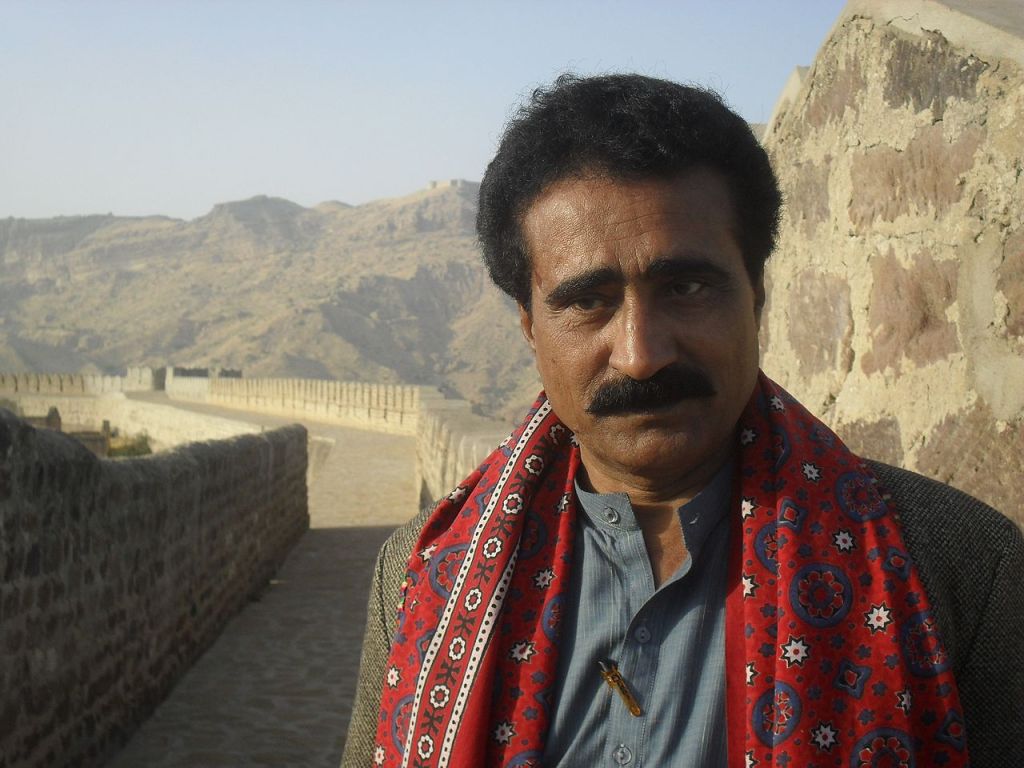
Aziz Kingrani spent 35 years of his career educating students as a professor of Sindhi literature and now spends his time improving Wikipedia articles in multiple languages. He has been writing and publishing since 1974 and has over a dozen books published in Sindhi and English.
After searching the internet for information on historical and archaeological heritage – specifically the literary assets of Sindh, Pakistan – he did not find much information. He felt that this information should be made easily available to people and joined the Wikimedia movement in 2012.
Aziz has contributed articles in English, Sindhi and Urdu. He contributes mostly about historical heritage sites like the Thul (Stupa) Hairo Khan, Ancient Rock Carvings of Sindh, and Gazi Shah Mound. Prior to Aziz’s participation, these heritage sites had no presence in Wikipedia – including English Wikipedia! He’s currently working on an article about Indus script etched in stone found in the Kithar mountains. Assuming of course he can find enough reliable sources, which any non-western editor can tell you can be a challenge.
In 2017 Jogi Asad representing Sindhi Wikipedia and Muhammad Arif Soomro representing Urdu Wikipedia were interviewed in one of the KTN News programs hosted by Mustafa Jarwar. KTN is a Sindhi news channel from Pakistan. Aziz Kingrani was the one who helped to arrange this program.
This was the first televised interview covering the project and communities. The interviewees shared the scope of the Wikipedia projects – particularly English, Urdu, and Sindhi – as well as information about editing and project policies. They appealed to young people to join the movement to share free knowledge.
Aziz also worked with Asad Jogi Rajpar, Mehtab Ahmed and Arif Soomro to organize and participate in the first workshops in Pakistan around the Sindhi Wikipedia. Aziz hopes to continue media outreach in his region to promote awareness of Wikipedia in his country.
He keeps in touch with his collaborators on the projects over the phone as well as social media for discussions regarding language (structure and function) among other issues. Discussions around content happen on-wiki with talk pages. Having an active local chapter will help to organize awareness events and edit-a-thons. Providing local resources like laptops would also go a long way to helping the community contribute to projects. Finally, Aziz believes that initiatives should continue to be built around local young people—from primary school to university—in order to grow diversity and bring new energy and perspectives.
His message to new Urdu and Sindhi Wikipedia – and Wikipedians in general – is this, “I urge all the more and more people to contribute more and more content in their local languages. Specially, Urdu and Sindhi Wikipedians are appealed to contribute at large for enriching their languages on the Wikipedia. They also need to cooperate on different events and opportunities related with Wikimedia.”
You can find out more about Aziz Kingrani on the Sindhi Wikipedia. Feel free to leave a comment or question for him on his talk page, or in the discussion below.
Update 23/12/19: The original article incorrectly stated Aziz was the one interviewed by KTN News. The correct interview participants were Jogi Asad and Muhammad Arif Soomro. Mr. Kingrani helped to arrange this program.
Interview by Syed Muzammiluddin, Wikimedia community volunteer. This profile has been lightly edited for length and clarity. You can see past profiles of Wikimedians by Muzammil at diff.wikimedia.org and here on Wikimedia Space.

Can you help us translate this article?
In order for this article to reach as many people as possible we would like your help. Can you translate this article to get the message out?
Start translation